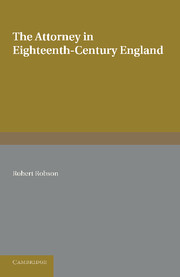Book contents
- Frontmatter
- Dedication
- Contents
- General Editor's Preface
- Preface
- Chapter I Attorneys and Solicitors Before 1700
- Chapter II Regulation of the Profession
- Chapter III The Society of Gentlemen Practisers
- Chapter IV The Provincial Law Societies
- Chapter V The Making of an Attorney
- Chapter VI The Attorney in Local Society
- Chapter VII Estates and Elections
- Chapter VIII Administration and Finance
- Chapter IX Two Attorneys
- Chapter X The Road to Respectability
- Appendix I The Apprenticeships of Richard Carre and Samuel Berridge
- Appendix II The Admission of an Attorney
- Appendix III Christopher Wallis: Notes from the Journal
- Appendix IV A Note on Numbers
- Appendix V The Professions in the Eighteenth Century: a Bibliographical Note
- List of Primary Sources
- Index
Chapter II - Regulation of the Profession
Published online by Cambridge University Press: 05 June 2016
- Frontmatter
- Dedication
- Contents
- General Editor's Preface
- Preface
- Chapter I Attorneys and Solicitors Before 1700
- Chapter II Regulation of the Profession
- Chapter III The Society of Gentlemen Practisers
- Chapter IV The Provincial Law Societies
- Chapter V The Making of an Attorney
- Chapter VI The Attorney in Local Society
- Chapter VII Estates and Elections
- Chapter VIII Administration and Finance
- Chapter IX Two Attorneys
- Chapter X The Road to Respectability
- Appendix I The Apprenticeships of Richard Carre and Samuel Berridge
- Appendix II The Admission of an Attorney
- Appendix III Christopher Wallis: Notes from the Journal
- Appendix IV A Note on Numbers
- Appendix V The Professions in the Eighteenth Century: a Bibliographical Note
- List of Primary Sources
- Index
Summary
ON 4 February 1700 Evelyn noted in his diary that the House of Commons had ‘voted that the exorbitant number of attorneys be lessened, (now indeed swarming and…eating out the estates of people, provoking them to go to law)’. In March 1701 leave was given to bring in a bill for the reduction of the number of attorneys and solicitors, and for regulating their practice. It received its second reading on 16 April, and was committed to the legal members of the house, but is not mentioned again.
The judges continued their work in the absence of this act, and controlled the profession with the means at their disposal. In 1704 they laid it down that all attorneys should belong to some Inn of Court or Chancery. This, however, proved impossible to enforce. The Inns of Court existed for quite other purposes than the judges were seeking to use them for, and could not be compelled to admit attorneys. The barristers, perhaps resenting the encroachments of the attorneys, and determined to preserve some distance and distinction between them, were successful in their attempt to exclude the attorneys from the Inns of Court.
What in part the judges had wanted was that each attorney should have a London address where writs and the like could be served on him, as well as putting them under the control of some body which could supervise them more closely than had been possible in the past. It may be that the judges knew that the Inns of Court would not admit the attorneys, and that they would in consequence be forced into the Inns of Chancery, which had been more properly their province, and which in the early stages of theprofession had played some part in their education. But by the eighteenth century, these were decaying bodies. And, moreover, as the country attorney became more important, and, as provincial life grew richer, more stationary in his own locality, membership of an Inn in London became increasingly pointless. The system of moots and readings in the Inns of Chancery had greatly declined, and in any case was no substitute for the apprenticeship system as a training for an attorney.
- Type
- Chapter
- Information
- The Attorney in Eighteenth-Century England , pp. 7 - 19Publisher: Cambridge University PressPrint publication year: 2013



